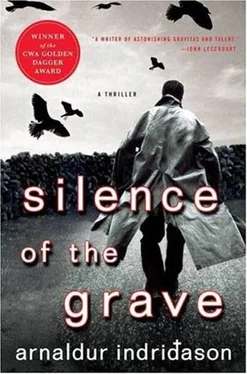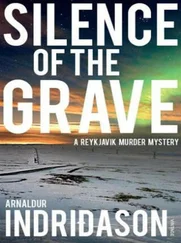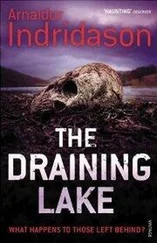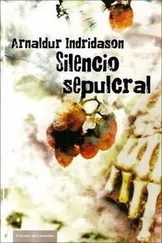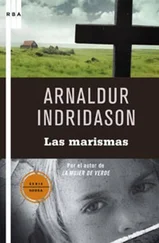"Because she kept quiet," Erlendur said.
"Yes, because she kept quiet," Elsa said. "Refused to name the father. He didn't know about the rape. I think that's quite certain."
"Could he have had an accomplice?" Erlendur asked. "Maybe got someone to do the job for him?"
"I don't follow."
"He rented his chalet in Grafarholt to a wife-beater and a thief. That tells us nothing in itself, but it's a fact all the same."
"I don't know what you're talking about. Wife-beater?"
"No, that's probably plenty for now. Maybe we're jumping to conclusions, Elsa. It's probably best to wait for the pathologist's report. Please excuse us if we…"
"No, by no means, no, thank you for keeping me informed. I appreciate that."
"We'll let you know how the case proceeds," Sigurdur Óli said.
"And you have the lock of hair," Elsa said. "For identification."
Elínborg stood up. It had been a long day and she wanted to go home. She thanked Bára and apologised for disturbing her so late in the evening. Bára told her not to worry. She followed Elínborg to the door and closed it behind her. A moment later the bell rang and Bára opened it again.
"Was she tall?" Elínborg asked.
"Who?" Bára said.
"Your sister," Elínborg said. "Was she unusually tall, average height or short? What kind of build did she have?"
"No, she wasn't tall," Bára said with a hint of a smile. "Far from it. She was strikingly short. Exceptionally petite. A wisp of a thing, our mother used to say. And it was funny seeing her and Benjamín walking along holding hands, because he was so tall that he towered over her."
The district medical officer phoned Erlendur, who was sitting by his daughter's bedside at the hospital just before midnight.
"I'm at the morgue," the medical officer said, "and I've separated the skeletons. I hope I haven't damaged anything. I'm no pathologist. There's earth all over the tables and the floor, a filthy mess really."
"And?" Erlendur said.
"Yes, sorry, well, we have the skeleton of the foetus, which was at least seven months old."
"Yes," Erlendur said impatiently.
"And there's nothing odd about that. Except…"
"Go on."
"It could well have been already born when it died. Or maybe stillborn. That's impossible to tell. But it's not the mother lying underneath it."
"Hang on… What makes you say that?"
"It can't be the mother lying under the child or buried with it, however you want to put it."
"Not the mother? What do you mean? Who is it then?"
"There's no doubt," the medical officer said. "You can tell from the pelvis."
"The pelvis?"
"The adult skeleton is a male. It was a man who was buried under the baby."
The winter on the hill was long and tough.
The children's mother kept on working at the Gufunes dairy and the boys took the school bus every morning. Grímur went back to delivering coal. After the racket was discovered, the army did not want to give him his old job again. The depot was closed and the barracks were moved en bloc down to Hálogaland. Only the fencing and fence posts remained, and the concreted yard that had been in front of the barracks. The cannon was removed from the bunker. People said the war was nearing its end. The Germans were retreating in Russia and a major counter-offensive was said to be pending on the western front.
Grímur more or less ignored the children's mother that winter. Hardly uttered a word, except to hurl abuse at her. They no longer shared a bed. The mother slept in Simon's room, while Grímur wanted Tómas to stay in his. Everyone except Tómas noticed how her stomach slowly swelled during the winter until it protruded like a bitter-sweet memory of the events of the summer, and a terrifying reminder of what would happen if Grímur stuck to his threats.
She played down her condition as best she could. Grímur threatened her regularly. Said he would not let her keep the baby. He would kill it at birth. Said it would be a retard like Mikkelína and the best thing would be to kill it straight away. "Yank-fucker," he said. But he did not physically assault her that winter. He kept a low profile, sneaking silently around her like a beast preparing to pounce on its prey.
She tried talking about a divorce, but Grímur laughed at her. She did not discuss her condition with the people at the dairy and concealed the fact that she was pregnant. Perhaps, right to the end, she thought that Grímur would recant, that his threats were empty, that when it came to the crunch he would not carry out his threats, that he would be like a father to the child in spite of everything.
In the end she resorted to desperate measures. Not to take vengeance on Grímur, although she had ample reason, but to protect herself and the child she was about to bear.
Mikkelína strongly sensed a growing tension between her mother and Grímur during that tough winter and also noticed a change in Simon that she found no less disturbing. He had always been fond of his mother, but now he hardly left her side from the time he came home from school and she finished work. He was more nervous after Grímur came back from prison on that cold autumn morning. As far as he could, he avoided his father and his anxiety about his mother haunted him more with each day that went by. Mikkelína heard him talking to himself sometimes and occasionally it sounded as if he was talking to someone she could not see who could not possibly be in their house: an imaginary person. Sometimes she heard him say out loud what he had to do to protect their mother and the child she would bear by his friend Dave. How it fell to him to guard her against Grímur. How the baby's life depended on him. No one else was at hand. His friend Dave would never return.
Simon took Grímur's threats very seriously. He firmly believed that he would not allow the baby to live. That Grímur would take it and they would never see it. Carry it off up the mountain and come back without it.
Tómas was silent as ever, but Mikkelína sensed a change in him as the winter wore on. Grímur allowed Tómas to spend the night in his room after he forbade the children's mother to sleep in the double bed and forced her to sleep in Tómas' bed, which was too small for her and uncomfortable. Mikkelína did not know what Grímur said to Tómas, but soon Tómas adopted a very different attitude towards her. He would not have anything to do with her and distanced himself from Simon as well, despite how close they had always been. Their mother tried to talk to Tómas, but he always backed away from her, angry, silent and helpless.
"Simon's turning a bit funny," Mikkelína heard Grímur say to Tómas once. "He's going funny like your mother. Keep a watch out for him. Make sure you don't get like him. Because then you'll turn funny too."
Once Mikkelína heard her mother talking to Grímur about the baby, the only time he allowed her to speak her mind, as far as she knew. Her mother's stomach was bulging by then and he prohibited her to work at the dairy any longer.
"You give up your job and say you have to look after your family," Mikkelína heard him order her.
"But you can say it's yours," her mother said.
Grímur laughed at her.
"You can."
"Shut up."
Mikkelína noticed that Simon was eavesdropping as well.
"You could easily say it's your child," their mother said in a soothing voice.
"Don't try that," Grímur said.
"No one needs to know anything. No one need find out."
"It's too late to try to put things right now. You should have thought of that when you were out on the moor with that fucking Yank."
"Or I could have it adopted," she said cautiously. "I'm not the first one this has happened to."
"Sure you're not," Grímur said. "Half the bloody city's been screwing them. But don't think that makes you any better for it."
Читать дальше
